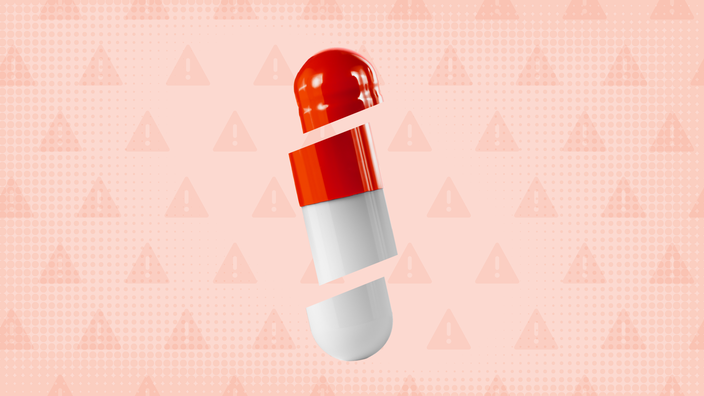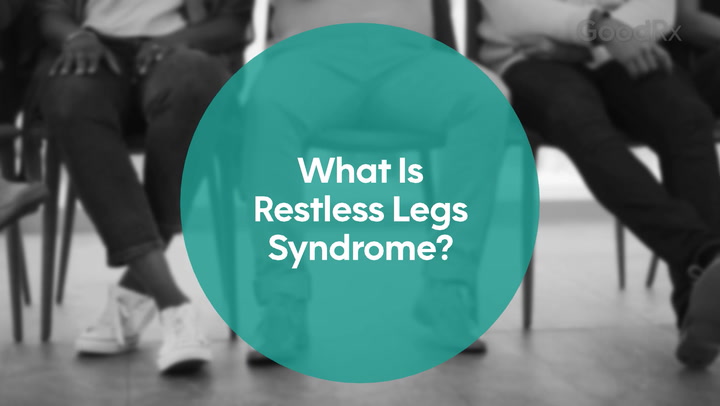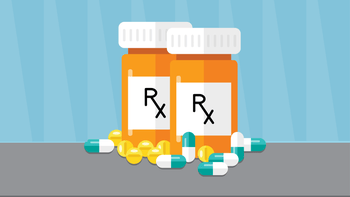
11 Lyrica Side Effects You Should Know About
Key takeaways:
Common Lyrica (pregabalin) side effects include sleepiness, dizziness, and swelling in the arms and legs (peripheral edema). Weight gain, blurry vision, and dry mouth are also possible. Most side effects usually go away within a few weeks of starting Lyrica.
Serious Lyrica side effects include slowed breathing, misuse, and suicidal thoughts or behaviors.
Let your healthcare team know if you’re experiencing Lyrica side effects. Give them a list of the medications you take so they can check for drug interactions with Lyrica. And make sure they’re aware of your full medical history.
Table of contents

Lyrica (pregabalin) is a prescription medication with several uses. It can treat certain types of seizures and nerve pain from health conditions like diabetes, fibromyalgia, and shingles.
As with all medications, Lyrica can have risks. Below, we'll discuss 11 Lyrica side effects and tips for managing them. Please note that this list doesn't cover all possible Lyrica side effects. If you experience symptoms not mentioned here, it's best to contact your prescriber for advice.
Lyrica side effects at a glance
Lyrica side effects range from mild to severe. Serious Lyrica side effects aren’t common, but they can happen.
Common and mild side effects:
Dizziness
Lack of coordination
Sleepiness
Swelling in the arms and legs
Weight gain
Increased appetite
Dry mouth
Constipation
Memory problems
Trouble focusing
Vision problems
Muscle twitching
Mood changes, including anxiety and depression
An elevated mood (“euphoria”)
Rare but serious side effects:
Slowed breathing
Suicidal thoughts or behaviors
Withdrawal when stopped abruptly
A decrease in certain blood cells that help your blood clot (platelets)
Heart rhythm problems
Misuse
Angioedema
Muscle pain or weakness along with a fever
These serious side effects may require emergency medical care. And while not technically a side effect, severe allergic reactions may also occur with Lyrica.
Below, we’ll cover 11 important Lyrica side effects in more detail.
1. Dizziness
The most common Lyrica side effect is dizziness, especially at higher doses of 300 mg daily or more. Dizziness often improves after a few weeks, but it may last the entire time you’re taking Lyrica in some cases.
A lack of coordination, balance problems, and muscle twitching can also happen. And all of these effects can increase your risk of falling — especially when combined. Falls are more likely if you’re age 65 or over, so it may be safer to avoid Lyrica entirely for some older adults. If needed, it’s best to take the lowest dose possible.
If you feel dizzy from Lyrica, move slowly, especially when switching positions, like going from seated to standing. And hold on to handrails or furniture for support as you move around. Additionally, avoid drinking alcohol while taking Lyrica. Alcohol can worsen dizziness. Other medications, such as opioids and benzodiazepines, can also worsen dizziness.
If dizziness continues, talk to your prescriber. They may recommend a lower dose of Lyrica. Or they may recommend Lyrica CR (pregabalin ER), the extended-release formulation of Lyrica. It’s a once-daily option taken at bedtime, so you may be able to avoid daytime dizziness with this medication.
Good to know: Along with dizziness, Lyrica can cause you to have trouble remembering things and difficulty focusing. These are good reasons to use caution when driving or doing activities that require alertness until you know how Lyrica affects you.
2. Sleepiness
Sleepiness is the second most common Lyrica side effect. It usually begins when you first start taking Lyrica, and it’s more common with doses of 300 mg per day or more. Usually, sleepiness from Lyrica improves over time. But for some people, it can last as long as they’re receiving treatment.
Like dizziness, sleepiness can increase your risk of falls and injuries. Use caution when driving or doing activities that require alertness (such as caring for a small child) when you start taking Lyrica or if your dose is increased.
If possible, avoid taking Lyrica with other medications that cause drowsiness. This includes muscle relaxants, sleep medications, and some antidepressants. Since it’s tough to keep track of all the medications that cause drowsiness, ask your prescriber and pharmacist to help you. Give them a list of all the medications you take. They’ll be able to check for Lyrica interactions.
3. Swelling of the arms and legs
Lyrica can cause swelling of your arms and legs (peripheral edema). This side effect is more likely if you’re also taking other medications that can cause fluid retention and swelling.
If you have a history of heart failure, edema from Lyrica can worsen your heart condition. It’s best to inform your healthcare team if you have a history of heart failure before starting Lyrica.
Limiting your salt intake and exercising regularly may help prevent and manage edema. But if the swelling is severe or bothersome, or you're experiencing rapid weight gain, let your prescriber know. They may need to make changes to your medications. If swelling comes on rapidly, is painful, or is warm to touch, seek emergency care. There could be a more serious issue going on.
Good to know: In rare cases, Lyrica can cause an allergic reaction called angioedema. Symptoms include swelling of the face, lips, and tongue. This is different from peripheral edema. Angioedema can be serious if it affects your breathing. If you’re having any facial swelling or trouble breathing, call 911.
4. Weight gain
Lyrica may cause weight gain, but it’s not exactly known why. It may be related to the fact that Lyrica can increase your appetite. Weight gain can also occur with edema.
The longer you take Lyrica, the more likely weight gain may be. It’s also more likely with higher doses (300 mg daily or more). It’s also more likely if you take other medications that can cause weight gain, including many other seizure medications.
In some people, weight gain can lead to a number of health issues, including Type 2 diabetes and heart problems. A balanced diet and regular exercise can help you maintain a healthy weight while taking Lyrica. But if you notice you’re gaining weight, talk to your prescriber for next steps.
Good to know: Weight gain from Lyrica can happen to anyone. It may or may not happen along with swelling from peripheral edema.
5. Dry mouth
Dry mouth is another possible Lyrica side effect. It's usually not harmful. But it can be uncomfortable — especially when you eat or talk.
If you experience dry mouth from Lyrica, here are some tips that might help:
Chew sugar-free gum or suck on sugar-free candy
Take small sips of water throughout the day
Use over-the-counter (OTC) saliva substitutes like Biotene or BioXtra
Tell your prescriber if your dry mouth worsens or isn’t managed with home remedies. A change to your Lyrica dose or switching to a different medication may help.
6. Blurry vision
Lyrica can cause blurry vision, double vision, or the development of a lazy eye. These vision problems are more likely with higher Lyrica doses. They may affect your ability to drive or do daily activities safely.
Blurry vision from Lyrica usually goes away over time. But it’s best to let your prescriber know if you notice any changes to your vision. They might refer you to an eye specialist to rule out something more serious.
7. Joint pain
Lyrica can sometimes cause joint pain (arthralgia).
Joint pain may be accompanied by swelling and stiffness. A hot or cold compress may help relieve discomfort. There are also OTC pain relief products that may help, such as Voltaren Arthritis Pain gel (diclofenac sodium 1%) or lidocaine 4% patches. But it’s best to talk to your prescriber before trying one of these options.
If your joint pain doesn’t get better or worsens, talk with your prescriber. They might change your Lyrica dose or have you try a different medication.
8. Constipation
Constipation can occur in some people taking Lyrica. It’s more likely with higher doses, but it can often be managed on your own by eating more high-fiber foods and drinking plenty of water.
If that doesn't work, your prescriber or pharmacist may recommend an OTC laxative like Dulcolax (bisacodyl). But if your constipation lasts for over a week or gets worse at any point, call your prescriber’s office. Watch for blood in your stool, an inability to eat or drink, or vomiting. If this occurs, call your prescriber’s office immediately. These may be signs that something more serious is going on.
9. Dependence and misuse
Lyrica is a controlled substance, which means it carries a risk of dependence and misuse. The risk of misuse is higher if you have a history of substance misuse or you’re taking opioid pain medications along with Lyrica. Taking Lyrica exactly as prescribed can help you avoid misuse. If you find yourself taking more than prescribed, talk to your prescriber right away.
Because your body can become dependent on Lyrica, it’s possible to have withdrawal symptoms if you stop taking it abruptly. These symptoms include headache, diarrhea, and nausea. Trouble sleeping, anxiety, and increased sweating are also possible. And if you take Lyrica for seizures, stopping it too quickly can raise your risk of seizures.
Don’t try to stop taking Lyrica on your own. Talk to your prescriber first. They can help you reduce your dose slowly over time to help lessen the chance of withdrawal symptoms.
If you or someone you know struggles with substance use, help is available. Call SAMHSA’s National Helpline at 1-800-662-4357 to learn about resources in your area.
10. Slowed breathing
Lyrica can cause slowed breathing (respiratory depression) for some people taking it. The risk is higher if you:
Are age 65 or over
Have a history of breathing problems, such as chronic obstructive pulmonary disease (COPD)
Take other medications that can affect your breathing, such as opioids and benzodiazepines
Signs of respiratory depression include slow, shallow breathing. Confusion, dizziness, and extreme fatigue are also possible. In serious cases, you could have bluish lips and fingernails or even lose consciousness. Call 911 or seek emergency care if you or someone around you experiences these symptoms while taking Lyrica.
Good to know: As mentioned, Lyrica may cause angioedema or allergic reactions that can also make it harder to breathe. It’s best to seek medical care right away if you develop a skin rash, hives, or swelling in your mouth or throat while taking Lyrica..
11. Suicidal thoughts and behaviors
All seizure medications may increase your risk of suicidal thoughts or behavior. This is rare, but it can happen as early as 1 week after starting Lyrica. It can also happen at any time during your treatment.
If you notice mood changes including new or worsening depression after starting Lyrica, reach out to your prescriber’s office right away.
If you or someone you know is having thoughts of suicide, you’re not alone, and help is available. Call the National Suicide Prevention Lifeline at 988, or text HOME to 741-741 to reach the Crisis Text Line.
When to contact your healthcare team
If you experience any Lyrica side effects that are affecting your day-to-day life or don’t improve within a few weeks, contact your prescriber’s office. They’ll evaluate your symptoms to determine whether you need a change to your medication regimen or if something else is going on.
If you experience severe symptoms, like falls that lead to injuries, swelling in the face and mouth, or trouble breathing, seek emergency care.
The bottom line
Common Lyrica (pregabalin) side effects include dizziness, sleepiness, and swelling in the arms and legs (peripheral edema). Weight gain, dry mouth, and blurry vision are also possible. In many cases, these side effects go away after a few weeks and can be managed at home in the meantime.
More serious Lyrica side effects include slowed breathing, misuse, and suicidal thoughts and behaviors. Severe allergic reactions are also possible. If you have trouble breathing or extreme mood changes while taking Lyrica, seek medical care right away.
Why trust our experts?


References
Aphena Pharma Solutions. (2021). Pregabalin [package insert].
Asclemed USA, Inc. (2024). Pregabalin- pregabalin capsule.
Cross, A. L., et al. (2022). Pregabalin. StatPearls.
Hoppe, C., et al. (2008). Bodyweight gain under pregabalin therapy in epilepsy: Mitigation by counseling patients? Seizure.
Memon, R. J., et al. (2023). Angioedema. StatPearls.
Moreland, B., et al. (2020). Trends in nonfatal falls and fall-related injuries among adults aged ≥65 Years — United States, 2012–2018. Morbidity and Mortality Weekly Report.
Parke-Davis Division of Pfizer Inc. (2020). Lyrica [package insert].
Patorno, E., et al. (2010). Anticonvulsant medications and the risk of suicide, attempted suicide, or violent death. Journal of the American Medical Association.
Samuel, M. J., et al. (2023). American Geriatrics Society 2023 updated AGS Beers Criteria for potentially inappropriate medication use in older adults. Journal of the American Geriatrics Society.
Toth, C. (2014). Pregabalin: Latest safety evidence and clinical implications for the management of neuropathic pain. Therapeutic Advances in Drug Safety.
Wynn, E., et al. (2022). Abstract 11912: Pregabalin use increases the risk of acute heart failure in patients with heart failure: A population-based study. Circulation.
Was this page helpful?
Related Articles
Browse medications
View AllResearch prescriptions and over-the-counter medications from A to Z, compare drug prices, and start saving.



























